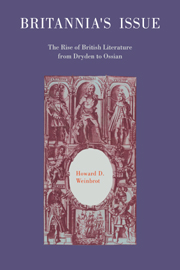Book contents
- Frontmatter
- Contents
- Acknowledgments and editorial notes
- INTRODUCTION: An overview of scope and method
- PART I CONTEXTS: INTELLECTUAL, PSYCHOLOGICAL, AND NATIONAL
- PART II TEXTS WITHIN CONTEXTS. ESSAYING ENGLAND: OUR GENIUS, OUR CLIME
- PART III GROWING ONE'S OWN. THE BRITISH ODE FROM COWLEY TO GRAY
- Prologue to Part III
- 9 GREEK JOCKEYS AND BRITISH HEROES: THE RISE AND FALL OF THE PINDARIC ODE
- 10 ODES TO THE NATION AND THE NORTH: DRYDEN, COLLINS, AND GRAY
- PART IV EXPANDING THE BORDERS. JEWS AND JESUS: THIS ISRAEL, THIS ENGLAND
- PART V CELTS, GERMANS, AND SCOTS: TOWARDS A UNITED KINGDOM
- APPENDIX: The text of Handel's “Israel in Egypt”
- Index
Prologue to Part III
Published online by Cambridge University Press: 15 December 2009
- Frontmatter
- Contents
- Acknowledgments and editorial notes
- INTRODUCTION: An overview of scope and method
- PART I CONTEXTS: INTELLECTUAL, PSYCHOLOGICAL, AND NATIONAL
- PART II TEXTS WITHIN CONTEXTS. ESSAYING ENGLAND: OUR GENIUS, OUR CLIME
- PART III GROWING ONE'S OWN. THE BRITISH ODE FROM COWLEY TO GRAY
- Prologue to Part III
- 9 GREEK JOCKEYS AND BRITISH HEROES: THE RISE AND FALL OF THE PINDARIC ODE
- 10 ODES TO THE NATION AND THE NORTH: DRYDEN, COLLINS, AND GRAY
- PART IV EXPANDING THE BORDERS. JEWS AND JESUS: THIS ISRAEL, THIS ENGLAND
- PART V CELTS, GERMANS, AND SCOTS: TOWARDS A UNITED KINGDOM
- APPENDIX: The text of Handel's “Israel in Egypt”
- Index
Summary
The British ode, perhaps even more than the British epic, follows an approximate pattern – discovery of the past, absorption of what is of value for a different modern culture, and rejection of what is useless or pernicious. In the case of the ode, especially the “great ode,” however, the chief progenitor is native rather than classical. Greek Pindar was little known in 1656 when Cowley's versions of him flamed upon the world; they started a conflagration that was not extinguished until after the different but cognate nominally Romantic odes. The eighteenth century has too often been thought an age of prose or, at best, one in which the lyric emerges only in its later pre-Romantic years or, in Northrop Frye's influential term, during the age of sensibility. Actually, the eighteenth-century lyric moment lasts for about 150 years.
Cowley could be so successful in adapting Pindar for some of the same reasons that Pope was successful in adapting Homer – the medley of ancient Greek reputation and modern British needs. On balance, Pindar's classical values and forms, but not his energy and spirit, were alien to modern British practice. Since classical theology was irrelevant, most eighteenth-century readers denied the power of the odes' key device of linking man to god. Since the celebration of boxers, wrestlers, or jockeys seemed inherently unheroic, those readers also denied the power of Pindar's subject – indeed of Pindar himself, whose uncertain sexual morality and apparent willingness to write on minor subjects for major sums was, surely, unknown to virtuous eighteenth-century poets.
- Type
- Chapter
- Information
- Britannia's IssueThe Rise of British Literature from Dryden to Ossian, pp. 331 - 333Publisher: Cambridge University PressPrint publication year: 1993



